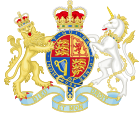- Courts Act 1971
-
The Courts Act 1971[1] 
Parliament of the United KingdomLong title An Act to make further provision as respects the [Senior Courts] and county courts, judges and juries, to establish a Crown Court as part of the [Senior Courts] to try indictments and exercise certain other jurisdiction, to abolish courts of assize and certain other courts and to deal with their jurisdiction and other consequential matters, and to amend in other respects the law about courts and court proceedings.[2] Statute book chapter 1971 c 23 Dates Royal Assent 12 May 1971 Status: Text of statute as originally enacted Revised text of statute as amended The Courts Act 1971 is an Act of the Parliament of the United Kingdom (c 23) the purpose of which was to reform and modernise the courts system of England and Wales.
It established the Crown Court, introduced the posts of circuit judge and recorder, and abolished various local courts across the country. Many of its provisions have since been repealed by the Senior Courts Act 1981, but the essential structure described in the Act is still in place.
The first part of the Act concerns the new Crown Court. It is established as part of the Supreme Court of Judicature, replacing courts of assize and Quarter Sessions. The appellate jurisdiction of these courts is transferred, and the new court given exclusive jurisdiction in "trial in indictment". It is described as a "superior court of record" for England and Wales. This section has now been superseded by the Supreme Court Act.
The courts abolished by this Act are:
- all assize courts
- all quarter sessions
- The Court of Chancery of the County Palatine of Lancaster (merged with the High Court)
- The Court of Chancery of the County Palatine of Durham and Sadberge (merged with the High Court)
- The Mayor's and City of London Court (a new county court is established with the same name)
- The Tolzey and Pie Poudre Courts of the City and County of Bristol
- The Liverpool Court of Passage
- The Norwich Guildhall Court
- The Court of Record for the Hundred of Salford
The officers of these courts were generally eligible to become circuit judges.
The post of circuit judge is introduced in the second part of the Act. They sit in the Crown Court and county courts, are appointed by the monarch on the Lord Chancellor's advice, and retire at the age of 72 (this has now been changed to 70 by the Judicial Pensions and Retirement Act 1993). The Lord Chancellor may also sack a circuit judge on the grounds of "incapacity or misbehaviour". Judges are to have a salary and pension, and must take an oath of office. The act also introduces part-time Crown Court judges, known as recorders, who are similarly appointed by the Lord Chancellor.
The fourth part of the Courts Act governs the selection of juries and related rules; it has since been repealed by the Juries Act 1974. Most of the remainder of the Act is about other miscellaneous administrative provisions relating to appointments, payment, and accommodation; these have almost all been repealed by the Supreme Court Act and other justice legislation.
References
- Halsbury's Statutes,
- Civil Procedure (The White Book), Sweet & Maxwell, 2006, Volume 2, 9B-83 - 9B-93
- ^ The citation of this Act by this short title is authorised by section 59(1) of this Act.
- ^ The words in brackets were substituted on 1 October 2009 by the sections 59 and 148 of, and paragraph 4 of Schedule 11 to, the Constitutional Reform Act 2005. As to commencement see articles 2(b) and (d) of SI 2009/1604.
UK Legislation
- Official text of the Courts Act 1971 as amended and in force today within the United Kingdom, from the UK Statute Law Database
- Official text of the Courts Act 1971 as originally enacted within the United Kingdom, from the UK Statute Law Database
United Kingdom legislation Pre-Parliamentary legislation Acts of Parliament by states preceding
the Kingdom of Great BritainActs of the Parliament of England to 1483 · 1485–1601 · 1603–1641 · Interregnum (1642–1660) · 1660–1699 · 1700–1706
Acts of the Parliament of Scotland
Acts of the Parliament of Ireland to 1700 · 1701–1800Acts of Parliament of the
Kingdom of Great Britain1707–1719 · 1720–1739 · 1740–1759 · 1760–1779 · 1780–1800
Acts of Parliament of the United Kingdom of
Great Britain and Ireland and the United
Kingdom of Great Britain and Northern IrelandChurch of England Measures Legislation of devolved institutions Acts of the Scottish Parliament
Acts and Measures of the Welsh Assembly
Acts of the Northern Ireland Assembly / of the Northern Ireland Parliament
Orders in Council for Northern IrelandSecondary legislation Categories:- United Kingdom Acts of Parliament 1971
- English laws
Wikimedia Foundation. 2010.

